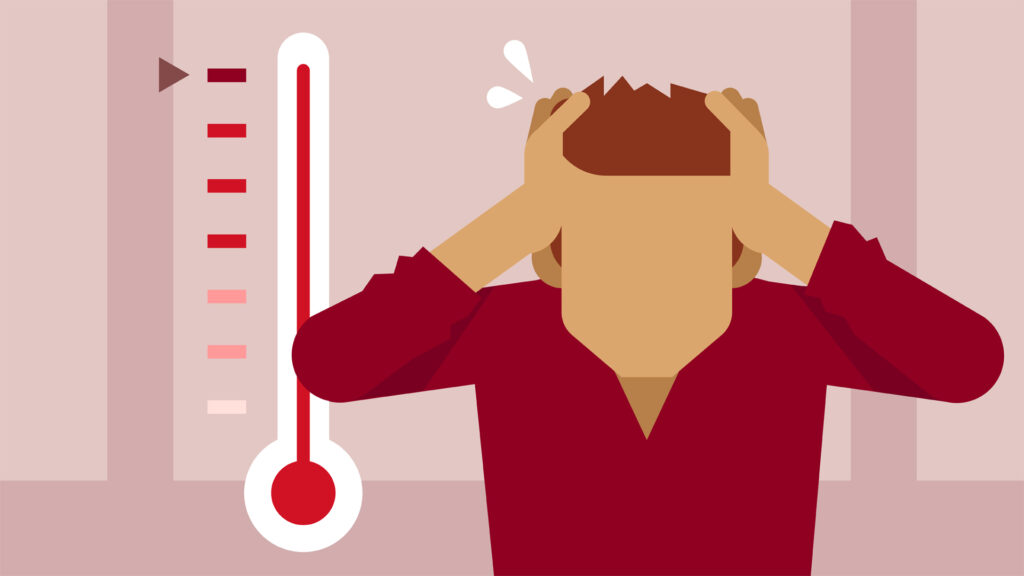Do you feel like you’re constantly angry? Are your anger management techniques not working? If so, read on for 10 steps to anger control. Anger can be a destructive emotion if it’s not managed properly. It can lead to fights, arguments, and even violence. The good news is that anger can be controlled with some effort and practice. In this blog post, we will discuss the 10 steps that will help you reduce and manage your anger.
Contents
- 1 What Is Anger?
- 2 Is There a Need For Anger Control?
- 3 Steps For Anger Control
- 3.1 Acknowledge Your Anger
- 3.2 Identify the Cause of Your Anger
- 3.3 Express Your Anger in a Healthy Way
- 3.4 Find Ways to Relax and de-Stress
- 3.5 Learn to compromise
- 3.6 Talk About Your Anger
- 3.7 Breathe
- 3.8 Count to Ten
- 3.9 Walk Away
- 3.10 Focus on the Positive
- 3.11 Try Relaxation Techniques
- 3.12 Try to See Things From the Other Person’s Perspective
- 3.13 Talk to Someone You Trust
- 3.14 Challenge Your Thoughts
- 3.15 Focus on the Solution, Not the Problem
- 3.16 Practice Self-Care
- 3.17 Set Limits With Others
- 3.18 Seek Professional Help
- 4 Conclusion
What Is Anger?

Anger is one of the basic human emotions, along with happiness, sadness, fear, and love. Everyone feels anger at times. Anger is a normal reaction to feeling threatened, frustrated, or thwarted in some way.
Most people feel angry when they perceive that someone or something has done them wrong. Other triggers for anger include feeling hurt, frustrated, powerless, or anxious. While it’s perfectly normal to experience these kinds of emotions from time to time, some people have difficulty managing their anger in healthy ways.
If you find yourself getting angry frequently or struggling to control your temper, you may benefit from learning some anger management techniques. Keep reading to learn more about what anger is and how you can manage it in healthy ways.
Is There a Need For Anger Control?
Controlling your anger is not easy. It requires a lot of effort and self-control. However, it is necessary if you want to live a happy and peaceful life.
Sometimes there may be a need for anger management. If you are constantly angry, it can lead to problems in your personal and professional life. It can damage relationships and cause physical health problems. Sometimes, it may even lead to violence.
There may be many reasons why you may need anger control. Maybe you had a bad day at work or someone cut you off in traffic. Whatever the reason, it is important to find ways to control your anger.
Steps For Anger Control

There are many steps for anger control. However, these are the most important ones:
Acknowledge Your Anger
One of the first steps is to acknowledge your anger. This may seem like a simple step, but it is very important. Ignoring your anger will not make it go away. It may make it worse. Acknowledging your anger allows you to deal with it healthily. Sometimes there may be a need for anger management. If you are constantly angry, it can lead to problems in your personal and professional life. It can damage relationships and cause physical health problems. Sometimes, it may even lead to violence.
Identify the Cause of Your Anger
The next step is to identify the cause of your anger. This may be difficult to do, but it is important. Once you know what is causing your anger, you can find ways to deal with it. Maybe you are angry because someone hurt your feelings or because you are stressed out about something. Identifying the cause of your anger will help you find ways to deal with it effectively. It also allows you to be more aware of your triggers and how to avoid them.
Express Your Anger in a Healthy Way
It is important to express your anger healthily. This means that you should not bottle up your anger or try to suppress it. Doing this can make things worse. Instead, you should find healthy ways to express your anger. This may include talking to someone about what is making you angry, writing down your thoughts, or going for a run. Expressing your anger healthily will help you feel better and prevent it from building up inside of you.
Find Ways to Relax and de-Stress
One of the best ways to deal with anger is to find ways to relax and de-stress. This may include yoga, meditation, or deep breathing exercises. Taking a break from your stressors can also be helpful. Maybe you need to take a few days off of work or take a vacation. Finding ways to relax and de-stress will help you feel calmer and more in control.
Learn to compromise
In some cases, the best way to deal with anger is to learn to compromise. This may mean that you have to give up something that you want to avoid an argument or conflict. However, compromising can be very beneficial. It can help you resolve problems without getting angry. Learning to compromise will take time and practice, but it is worth it. Sometimes, it may even lead to violence.
Talk About Your Anger
Once you have identified the cause of your anger, it is important to talk about it. This may be difficult, but it is necessary. Talking about your anger will help you find ways to deal with it effectively. It will also allow you to communicate your needs and wants clearly and calmly. There may be a need for anger management. If you are constantly angry, it can lead to problems in your personal and professional life. It can damage relationships and cause physical health problems. Sometimes, it may even lead to violence.
Breathe

When you are angry, your body goes into “fight or flight” mode. This means that your heart rate and blood pressure increase and you start to breathe more quickly. This can make you feel even angrier. That’s why it’s important to take some deep breaths and try to calm down. Sometimes, it may even lead to violence.
Count to Ten
This is a classic anger management technique, but it does work. When you start to feel angry, take a deep breath and count to ten. This will give you a moment to calm down and think about what is making you angry. It will also help you avoid saying or doing something that you might regret later.
Walk Away
Sometimes the best thing you can do is walk away. Not in a confrontational way, but simply excuse yourself to take a break. This will give you time to calm down and think about the situation more clearly. Sometimes, the other person may be receptive to talking things out after some time has passed as well.
Focus on the Positive
It’s easy to dwell on the negative when you’re feeling angry, but try to focus on the positive aspects of the situation instead. For example, if you’re upset about a fight with your partner, think about all of the times when they’ve made you laugh or been there for you. Focusing on the positive can help diffuse anger and make it easier to resolve conflicts.
Try Relaxation Techniques

There are several different relaxation techniques that can help you calm down when you’re feeling angry. Deep breathing, for example, can help slow your heart rate and clear your head. Progressive muscle relaxation involves tensing and relaxing different muscle groups in your body to help reduce tension. Finding the relaxation technique that works best for you can make a big difference in how well you’re able to manage anger.
Try to See Things From the Other Person’s Perspective
It can be helpful to try to see things from the other person’s perspective when you’re feeling angry. This doesn’t mean that you have to agree with them, but it can help you understand their point of view and why they may be acting the way they are. In some cases, this can even help diffuse the situation entirely.
Talk to Someone You Trust
Sometimes talking to someone else about what’s making you angry can help. Find someone who will listen without judging or trying to fix the situation. Just having someone to vent to can make a big difference in how you’re feeling. Also, try to avoid venting to someone likely to get angry themselves – this will only make the situation worse.
Challenge Your Thoughts
When you’re feeling angry, it’s easy to let your thoughts spiral out of control. But trying to challenge these thoughts can help you keep them in perspective and prevent them from making the situation worse. For example, if you’re thinking “this person is always doing this,” try to remember a time when they didn’t do what you’re angry about. Or, if you’re thinking “this is such a disaster,” try to remind yourself of other times when you’ve faced challenges and been able to overcome them.
Focus on the Solution, Not the Problem
When you’re feeling angry, it’s easy to get caught up in what’s wrong and what you don’t want. But instead of dwelling on the problem, try to focus on finding a solution. This can help prevent the situation from getting worse and also make it easier to find a way to resolve the conflict.
Practice Self-Care

It’s important to take care of yourself both physically and emotionally when you’re dealing with anger. Make sure to get enough sleep, eat a healthy diet, and exercise regularly. These things will help you feel better overall and be better equipped to deal with challenging situations. Additionally, try to do things that make you happy and relax when you’re feeling stressed. This can be anything from reading or listening to music to spending time with friends or family.
Set Limits With Others
If you find yourself getting angry often, it may be necessary to set some limits with the people in your life. For example, if someone repeatedly does something that makes you angry, tell them that you won’t tolerate it and explain what they need to do differently. It’s also important to set boundaries in relationships – let the other person know what behaviors are acceptable and what aren’t. If someone isn’t willing to respect your boundaries, it may be necessary to distance yourself from them.
Seek Professional Help
If you’re struggling to control your anger on your own, it may be time to seek professional help. A therapist can help you identify the things that trigger your anger and teach you how to better deal with them. If you have a history of violence or have been arrested for angry outbursts, it’s especially important to seek professional help. Anger management classes can also be helpful in some cases.
Conclusion
Anger is a very normal, human emotion. But when it’s out of control, it can wreak havoc on your life and the lives of those around you. If you’re struggling to manage your anger, there is hope. Some steps can help you get a handle on your anger and start living a happier, healthier life. Also, don’t forget to talk to a mental health professional if you’re struggling to control your anger on your own. They can help you develop an individualized plan to manage your anger and improve your life. Thanks for reading.
Hope this article was of help to you! If you are suffering from anxiety or anger, you may seek help from Therapy Mantra. We have a team of highly trained and experienced therapists who can provide you with the tools and skills necessary for overcoming anger. Contact us today to schedule an online therapy or download our free Android or iOS app for more information.


